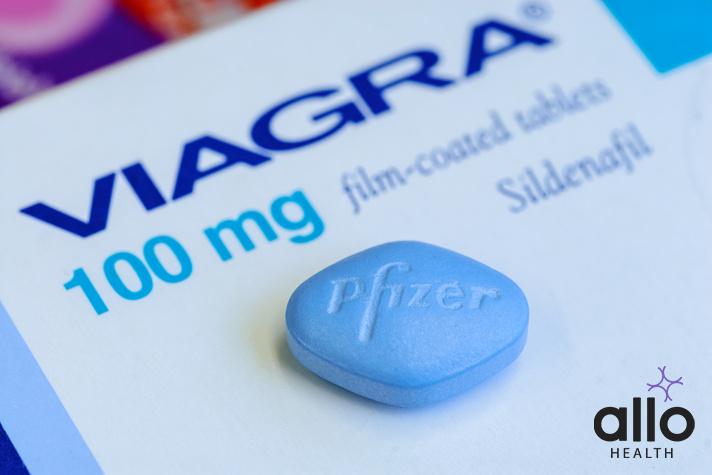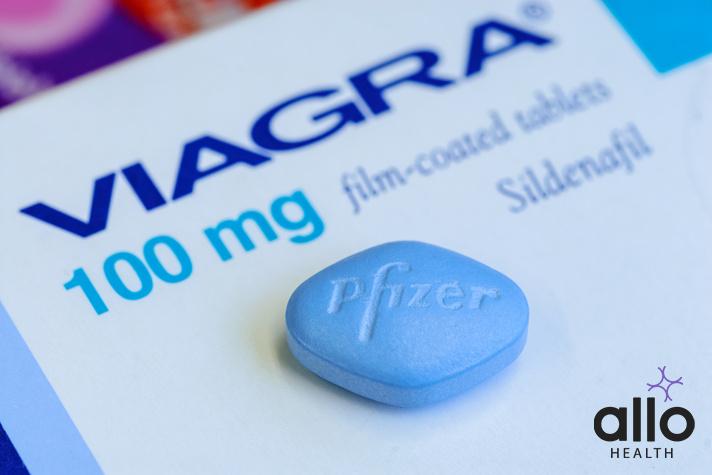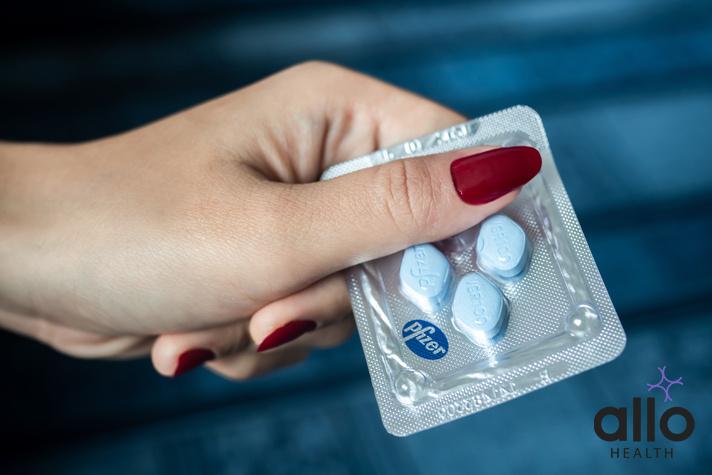Does Viagra Increase Sex Time? An In-depth Analysis

Allo Health is dedicated to personalized well-being, offering support and trusted information tailored to individual health goals. The platform emphasizes human-generated content, led by a distinguished medical team of experts, including physicians and sexual health specialists. Their commitment to credibility involves rigorous fact-checking, authoritative research, and continuous updates to ensure accurate, up-to-date information. Allo Health's unique approach goes beyond conventional platforms, providing expert-led insights and a continuous commitment to excellence, with user feedback playing a crucial role in shaping the platform's authoritative voice.

Dr. Ajay Ravi holds an MBBS degree from JSS Medical College, Mysore. He has worked closely with the psychiatry department at JSS and has gained experience in the field of Sexual health and medicine.
Why This Was Upated?
Our experts continually monitor the health and wellness space, and we update our articles when new information became available.
Updated on 17 March, 2024
- Article was updated as part of our commitment to diversity, equity, and inclusion.

"The following blog article provides information about a drug or brand name drug and its potential effects or benefits. However, it is crucial to understand that this information is intended for general educational purposes only and should not be considered a substitute for professional medical consultation. It is highly recommended to consult with a qualified healthcare professional before making any decisions regarding medication, treatment, or healthcare management.
Book consultation
Individuals have unique medical conditions, and the information provided in this article may not be applicable to everyone. Only a qualified healthcare provider can evaluate your specific medical situation, taking into account your medical history, conducting appropriate tests, and providing personalized advice and recommendations. They are equipped to make informed decisions tailored to your individual needs.
It is crucial to emphasize that self-diagnosis, self-medication, or disregarding medical advice can have serious health consequences. This article may reference specific brand names or drugs for illustrative purposes. Mention of these names does not imply endorsement, recommendation, or guarantee of their efficacy or safety. The choice of medication should be based on discussions and individualized guidance from a healthcare professional who has a comprehensive understanding of your medical condition.
"In the realm of sexual health conditions, Viagra is a name that resonates with many. Known scientifically as sildenafil citrate, Viagra has been a groundbreaking treatment for erectile dysfunction (ED) since its introduction. However, a common query among many individuals is, “Does Viagra increase sex time?” This article aims to shed light on this question by exploring how Viagra works, its effects on sexual performance, and what users can realistically expect in terms of prolonging sexual activity.
Understanding Viagra
Viagra, a widely recognized prescription medication, is formulated to address erectile dysfunction (ED)—a condition where achieving or maintaining an erection becomes a challenge. This medication is suitable for adult men aged 18 and over who are facing difficulties with erectile performance.
The active ingredient in Viagra, sildenafil, falls under the category of phosphodiesterase type 5 (PDE5) inhibitors—a group of medications known for their similar mechanism of action. Viagra operates by enhancing the blood flow to the penis, facilitating the process of achieving and sustaining an erection, contingent on sexual stimulation.
Mechanism and Duration
Viagra, a well-known medication for treating erectile dysfunction (ED) in males, has garnered interest for its potential effects and duration of action. Below, we delve into how Viagra works, its onset, and how long it lasts, including its application for women.
Viagra enhances erectile function by targeting a specific biochemical pathway:
- Mechanism of Action: Viagra operates by inhibiting an enzyme called phosphodiesterase-type 5 (PDE-5). Normally, PDE-5 breaks down cyclic guanosine monophosphate (cGMP), a substance that promotes blood flow into the penis. By blocking PDE-5, Viagra allows cGMP to facilitate prolonged blood flow, aiding in achieving and maintaining an erection.
- Blood Vessel Dilation: Additionally, Viagra contributes to the dilation of blood vessels, further improving blood flow to the penis during sexual arousal.
- General Onset: Viagra is known for its quick action, typically taking effect within 1 hour of ingestion.
- Variable Onset: The onset can vary, with some individuals experiencing effects as soon as 30 minutes and others up to 4 hours after taking the drug.
- On an Empty Stomach: Taking Viagra without food can accelerate its action, as high-fat meals may delay its effectiveness.
- Peak Efficacy: Viagra’s effects are most potent approximately 1 hour post-consumption, with its effectiveness gradually diminishing over the next few hours.
- System Clearance: The half-life of Viagra is about 4 hours, indicating that half of the drug is metabolized by this time. It typically takes around 20 hours for Viagra to be entirely cleared from the system.

Can Viagra Enhance Your Sexual Stamina?
While Viagra is primarily prescribed to address erectile dysfunction (ED) by facilitating easier erections, its potential to extend the duration one lasts in bed has garnered interest. Although not directly designed for this purpose, certain evidence suggests that Viagra and other phosphodiesterase type 5 (PDE5) inhibitors might indeed play a role in prolonging sexual encounters.
- Understanding Viagra’s Primary Function: Viagra enhances blood flow to the penis, aiding in achieving and maintaining an erection, which is central to its role in treating ED. It generally does not affect how long you can have sex (this link is for POV sex), your sensitivity during the act, or the timing of orgasm and ejaculation.
- Impact on the Refractory Period: Interestingly, Viagra and similar medications have been noted to shorten the refractory period—the downtime following an orgasm when the body is unresponsive to sexual stimulation and cannot achieve an erection. A shorter refractory period means the possibility of engaging in sexual activities again sooner after an orgasm, potentially leading to improved sexual stamina for some individuals.
- Duration of Viagra’s Effects: The effects of Viagra can last between 4 to 8 hours, depending on the dosage. This duration offers a window within which sexual activity can be initiated more easily post-consumption. However, it’s critical to understand that while the effects of the drug last for hours, sustaining an erection for this entire period is not only unnecessary but could be harmful.
- Risks of Prolonged Erections: An erection lasting longer than 4 hours, known as priapism, is a medical emergency. Priapism involves trapped, oxygen-deprived blood in the penis, which can lead to permanent tissue damage if not treated promptly.
- Ideal Duration of an Erection: Considering the potential risks associated with prolonged erections, it’s useful to know the typical duration of sexual encounters. Research suggests that the average time from initiation to orgasm and ejaculation for men is around 5 to 7 minutes, with a broad range that could extend from a minute to over half an hour.
Duration of Viagra’s Effectiveness: How Long It Works
Viagra’s effectiveness is a key concern for those considering its use. Upon oral administration, Viagra is rapidly absorbed by the body, with its blood concentration peaking about 30–120 minutes after intake, most notably around the 60-minute mark. This timing is crucial for planning as the effects of Viagra can be felt within this window, making sexual activity more achievable.
The duration of Viagra’s effects can last up to 4 hours, with its potency strongest within the first 2 hours post-consumption. Dosages vary from 25, 50, to 100 milligrams (mg), with studies indicating that side effects do not significantly increase with higher doses. However, the effectiveness does, making a 100 mg dose a popular choice for those seeking a more robust response.
Key Considerations:
- Timing: Optimal results are often achieved by taking Viagra about 1 hour before sexual activity.
- Food Intake: While Viagra can be taken with or without food, high-fat meals might delay its absorption, potentially postponing its effects.
The Impact of Viagra on Sex Time
While Viagra is effective in causing an erection, its impact on prolonging sex time is indirect. For individuals with erectile dysfunction, Viagra can help maintain an erection for a longer period, which might indirectly extend the time of sexual intercourse. However, it’s crucial to note that Viagra does not have a direct effect on delaying ejaculation or increasing the stamina for sexual activities.
Psychological Effects
The confidence gained from the ability to maintain an erection with Viagra can also indirectly influence the duration of sexual activity. This psychological boost can reduce anxiety related to performance, potentially leading to a more prolonged and satisfying sexual experience.
Addressing Premature Ejaculation
For those specifically looking to increase sex time due to premature ejaculation, other treatments are more appropriate. These may include behavioral techniques, effective medications specifically designed to delay ejaculation, or counselling to address any underlying psychological factors.
Exploring Alternatives to Viagra for Erectile Dysfunction Treatment
While Viagra is a well-known treatment for ED, several alternatives exist, offering similar benefits:
- Other PDE5 Inhibitors: Medications like Stendra, Cialis, and Levitra function similarly to Viagra by enhancing blood flow to the penis.
- Lifestyle Changes: Increasing physical activity, quitting smoking, losing weight, reducing alcohol consumption, and adjusting medications that contribute to ED can also improve erectile function.
- Psychotherapy or Counseling: For ED stemming from psychological factors like stress or depression, therapy can offer effective treatment.
Recognizing When Viagra Takes Effect
Understanding when Viagra is at work in your system is quite straightforward—you won’t be left guessing. The onset of Viagra’s effects typically occurs between 30 minutes to an hour after taking the pill. However, this timeframe can extend slightly if the drug is taken alongside a substantial, high-fat meal.
Physical Signs of Viagra’s Activation
When Viagra begins to take effect, the changes are primarily physical rather than psychological or emotional. Here’s what to look out for:
- Ease of Achieving Erections: The most noticeable sign that Viagra is working is the newfound ease in getting an erection during sex. This improvement can manifest as being able to achieve an erection under circumstances where it was previously challenging or noticing a significant enhancement in the firmness of erections.
- Maintenance of Erection: Viagra may not always make your erection develop quicker or feel firmer than it typically would. Instead, its efficacy might be more pronounced in how it helps sustain an erection throughout sexual activity.
What Viagra Does Not Do
It’s crucial to note what Viagra doesn’t do to set realistic expectations:
- No Sudden Erections: You won’t automatically get an erection by merely taking Viagra. Sexual arousal is still necessary for Viagra to show its effect.
- No Impact on Sex Drive: Viagra does not serve as an aphrodisiac, meaning it won’t increase your sexual desire.
- No Psychoactive Effects: Taking Viagra won’t alter your mental state, thoughts, or perceptions during sex. Its action is strictly limited to facilitating physical responses.
Viagra vs. Cialis and Other ED Treatment Alternatives
When it comes to treating erectile dysfunction (ED), both Viagra and Cialis stand out as popular choices. However, several other alternatives are also available. Understanding the differences and similarities among these options can help you and your doctor decide which treatment is best for you.
Viagra vs. Cialis
- Uses: While both Viagra (sildenafil) and Cialis (tadalafil) are used to treat ED, Cialis also addresses benign prostatic hyperplasia (BPH) and the symptoms of ED that occur alongside BPH.
- Drug Class: Both medications belong to phosphodiesterase type 5 (PDE5) inhibitors, working by increasing blood flow to the penis to help achieve and maintain an erection.
- Dosing Differences: Cialis offers the flexibility of daily dosing for continuous effect or as-needed use, which can be advantageous for spontaneous sexual activity. Viagra is typically taken as needed, about an hour before sexual activity.
- Side Effects: While both drugs share common side effects like headaches, flushing, and indigestion, Cialis may cause muscle aches and back pain, whereas Viagra might lead to visual disturbances.
- Duration: Cialis is known for its longer duration of action, up to 36 hours, compared to Viagra, which lasts about 4 to 6 hours.
Viagra vs. Sildenafil
- Active Ingredient: Sildenafil is the active ingredient in Viagra, and it’s available as a generic medication. While Viagra is branded for ED, sildenafil treats both ED and pulmonary arterial hypertension (PAH) under the brand name Revatio.
- Cost: Generic sildenafil is typically less expensive than brand-name Viagra, making it a cost-effective option for treating ED.
- Efficacy and Safety: Both sildenafil and Viagra offer the same efficacy and safety profile, as they contain the same active ingredient.
Viagra vs. Vardenafil (Levitra)
- Similarities: Vardenafil (formerly known as Levitra) and Viagra are both PDE5 inhibitors used to treat ED. They have a similar mechanism of action and side effect profile.
- Differences: The primary differences lie in the duration of action and the speed at which they start working. Vardenafil may work a bit faster than Viagra, and while Levitra has been discontinued, generic vardenafil remains available.
- Choosing Between Them: The choice between Viagra and vardenafil may come down to personal preference, side effects, and how the body responds to each medication.
Other Alternatives
- Tadalafil (Cialis) and Avanafil (Stendra): Besides Viagra and vardenafil, these drugs offer additional options for treating ED, with Stendra noted for its rapid onset.
- Lifestyle Changes and Psychotherapy: For some, lifestyle modifications (such as exercise, diet adjustments, quitting smoking) and therapy can also improve ED.
- Devices and Surgery: In cases where medication is not effective, options like penile implants or vacuum erection devices might be considered.

Navigating Side Effects of Viagra: What You Need to Know
Viagra, widely recognized for its effectiveness in treating erectile dysfunction (ED) in men, has a profile of side effects ranging from mild to severe. Understanding these side effects can help users recognize when to seek medical advice or adjust their treatment plan. Below is a comprehensive overview of Viagra’s potential side effects, how to manage them, and when it’s critical to contact a healthcare professional.
Mild Side Effects of Viagra
Most users experience mild side effects that typically resolve within a few days to a couple of weeks. These include:
- Headache
- Flushing
- Indigestion
- Mild and temporary vision changes (such as a blue tinge in your vision, blurred vision, and sensitivity to light)
- Nasal congestion (stuffy nose)
- Back pain
- Muscle pain
- Nausea
- Dizziness
- Rash
If these side effects become severe or don’t go away, consulting with a doctor or pharmacist is recommended.
Serious Adverse Effects of Viagra
Though less common, Viagra can cause serious side effects. Immediate medical attention is advised if you experience:
- Non-arteritic anterior ischemic optic neuropathy (NAION): A condition that causes damage to your optic nerve, leading to sudden vision loss.
- Sudden hearing loss or decrease: Sometimes accompanied by tinnitus or dizziness.
- Allergic reactions: Symptoms can range from skin rash and itching to swelling and trouble breathing.
- Priapism: A long-lasting and sometimes painful erection.
- Low blood pressure: Especially when taken with certain other medications.
- Cardiovascular problems: Including heart attack, irregular heartbeat, or stroke, primarily in individuals with existing heart disease.
Managing Side Effects
For most mild side effects, simple measures can provide relief:
- Headaches, flushing, and dizziness might be eased by resting or lying down.
- Indigestion could be mitigated by taking Viagra with a snack or light meal, though this might delay its onset.
- Vision changes: Dimming lights may help with sensitivity to light.
If experiencing severe or persistent side effects, contacting a healthcare provider is crucial for advice on adjustment or alternative treatments.
When to Contact Your Doctor
Immediate contact with a doctor is necessary for serious side effects, such as:
- An erection lasting more than 4 hours (priapism)
- Symptoms of a heart failure or stroke during sexual activity
- Sudden vision or hearing loss
Considerations for Older Adults
Individuals aged 65 and older might experience higher levels of Viagra in their bloodstream, increasing the risk of side effects. A lower dosage may be prescribed to mitigate this risk.
Regarding Erectile Dysfunction (ED)
While Viagra is effective in treating ED, it’s essential to note that it does not cure ED but rather treats its symptoms. It’s also crucial to understand that Viagra does not cause an erection without sexual arousal.
Debunking Common Myths About Viagra
Viagra, a well-known medication for treating erectile dysfunction (ED), is often surrounded by myths and misconceptions. While it has been a game-changer for many men, understanding what Viagra can and cannot do is crucial. Let’s dispel some of the most common myths about Viagra’s effects.
Myth 1: Viagra Makes You Last Longer in Bed
The impact of Viagra on lasting longer in bed varies. While Viagra can improve overall sexual performance, its role in treating premature ejaculation (PE) is less straightforward. Some studies suggest it might be effective for PE, leading to its off-label use:
- A 2007 study found Viagra to be “effective and safe” for treating PE, showing higher efficacy than the SSRI paroxetine or the “squeeze” technique.
- Another study in 2005 indicated that Viagra didn’t significantly affect the time until ejaculation but did enhance men’s confidence, sexual satisfaction, and perception of ejaculatory control.
Myth 2: Taking Viagra Gives You an Immediate Erection
Contrary to popular belief, Viagra does not cause an instant erection. The medication requires sexual stimulation to work, with the Food and Drug Administration recommending its intake about 30 minutes to one hour before engaging in sexual activity.
Myth 3: Viagra Helps You Recover Faster After Orgasm
The belief that Viagra can shorten the refractory period, the time needed for a man to recover after sex, holds some truth. Studies have shown that ED medications can significantly reduce recovery time, with one study noting a decrease to an average of 2.6 minutes from 10.8 minutes in the placebo group. However, results can vary, indicating that Viagra’s effect on refractory time may not be consistent for all men.
Myth 4: Viagra Increases Your Sex Drive
A common misconception is that Viagra boosts your sex drive or libido. In reality, Viagra is designed to enhance your ability to achieve and maintain an erection but does not affect your sexual desire or arousal levels. Sexual interest is largely influenced by hormonal factors, such as testosterone levels, which Viagra does not alter. Instead, it facilitates erections in those already inclined towards sexual activity.
Important Health Considerations Before Taking Viagra
Before starting Viagra, a thorough discussion with your doctor about your health history is crucial. Certain medical conditions and factors can significantly affect your suitability for this medication. Below are key considerations to discuss with your healthcare provider:
- Recent Heart Issues: If you’ve experienced heart problems like a heart attack, stroke, high blood pressure, or recent heart surgery within the past 6 months, it’s essential to consult your doctor. Viagra demands a strong heart for sexual activity; your doctor may advise against its use if it could put undue stress on your heart.
- Conditions Affecting Penis Shape: Inform your doctor if you have Peyronie’s disease or any condition causing an unusual shape of the penis. Viagra increases the risk of priapism (painful erection lasting over 4 hours), which could lead to permanent damage.
- Sickle Cell Anemia and Similar Conditions: These issues heighten the risk of priapism. Disclose any blood cell disorders to your doctor to prevent potential damage to the penis.
- Risk of Vision Loss: Viagra may exacerbate or trigger new eye problems, especially in those with conditions like NAION or retinitis pigmentosa. Regular vision monitoring might be necessary.
- Pre-existing Hypotension: Viagra can further lower your blood pressure, potentially to unsafe levels. More frequent blood pressure monitoring may be recommended.
- Increased Bleeding Risk: Viagra might exacerbate bleeding disorders. Ensure your doctor is aware of any such conditions.
- Potential for Increased Bleeding: The risk of bleeding in the stomach may rise with Viagra use. Alert your doctor if you have a history of ulcers.
- Reactions to Viagra or Its Ingredients: If you’ve had allergic reactions to Viagra or any of its components, your doctor will likely advise against its use and suggest alternative treatments.
- Impaired Drug Clearance: Conditions affecting the kidney or liver can hinder the body’s ability to process Viagra, raising the risk of side effects. Full disclosure of these conditions is necessary.
Conclusion
In summary, while Viagra is a powerful tool in combating erectile dysfunction, its role in directly increasing sex time is limited. It aids in sustaining an erection when sexually stimulated, which may indirectly contribute to prolonged sexual intercourse for individuals with ED. However, it is not a cure-all for extending the duration of sexual activities. For concerns specifically related to premature ejaculation, exploring other treatments is advisable. Always consult with a healthcare provider to determine the most appropriate course of action for your specific needs and to ensure that Viagra is a safe option for you.
Most Asked Questions
-
Can Viagra extend the duration of sexual activity?
Viagra can indirectly help some men last longer by improving erection reliability. It does not directly extend sexual duration but may reduce the refractory period, allowing quicker recovery after orgasm.
-
How fast does Viagra work and how long does it last?
Viagra typically works within 30 to 60 minutes and its effects can last up to 4 to 6 hours. The duration can vary based on individual factors.
-
Will Viagra cause an instant erection?
No, Viagra requires sexual arousal to work. It enhances blood flow to the penis, aiding in achieving an erection when stimulated.
-
Can Viagra increase sex drive?
No, Viagra does not affect sex drive or libido. It aids in erectile function for men who are sexually aroused.
-
What should I consider before taking Viagra?
Discuss with your doctor if you have heart issues, penis shape irregularities, blood cell disorders, eye conditions, low blood pressure, bleeding disorders, stomach ulcers, allergies to Viagra, or kidney/liver problems. Also, mixing Viagra with alcohol may lower blood pressure further.








































